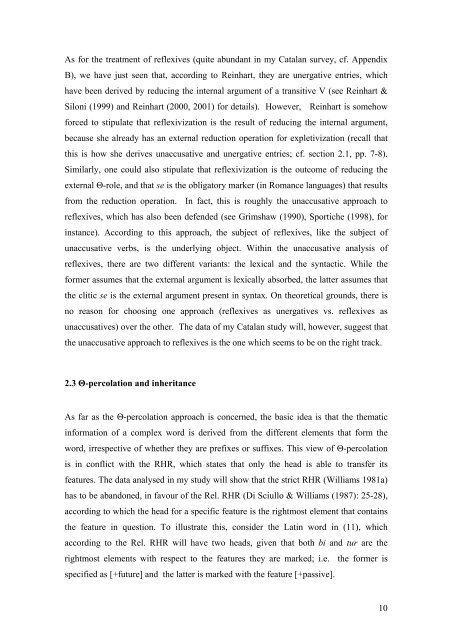Prefixation in English and Catalan - Departament de Filologia ...
Prefixation in English and Catalan - Departament de Filologia ...
Prefixation in English and Catalan - Departament de Filologia ...
You also want an ePaper? Increase the reach of your titles
YUMPU automatically turns print PDFs into web optimized ePapers that Google loves.
As for the treatment of reflexives (quite abundant <strong>in</strong> my <strong>Catalan</strong> survey, cf. Appendix<br />
B), we have just seen that, accord<strong>in</strong>g to Re<strong>in</strong>hart, they are unergative entries, which<br />
have been <strong>de</strong>rived by reduc<strong>in</strong>g the <strong>in</strong>ternal argument of a transitive V (see Re<strong>in</strong>hart &<br />
Siloni (1999) <strong>and</strong> Re<strong>in</strong>hart (2000, 2001) for <strong>de</strong>tails). However, Re<strong>in</strong>hart is somehow<br />
forced to stipulate that reflexivization is the result of reduc<strong>in</strong>g the <strong>in</strong>ternal argument,<br />
because she already has an external reduction operation for expletivization (recall that<br />
this is how she <strong>de</strong>rives unaccusative <strong>and</strong> unergative entries; cf. section 2.1, pp. 7-8).<br />
Similarly, one could also stipulate that reflexivization is the outcome of reduc<strong>in</strong>g the<br />
external Θ-role, <strong>and</strong> that se is the obligatory marker (<strong>in</strong> Romance languages) that results<br />
from the reduction operation. In fact, this is roughly the unaccusative approach to<br />
reflexives, which has also been <strong>de</strong>fen<strong>de</strong>d (see Grimshaw (1990), Sportiche (1998), for<br />
<strong>in</strong>stance). Accord<strong>in</strong>g to this approach, the subject of reflexives, like the subject of<br />
unaccusative verbs, is the un<strong>de</strong>rly<strong>in</strong>g object. With<strong>in</strong> the unaccusative analysis of<br />
reflexives, there are two different variants: the lexical <strong>and</strong> the syntactic. While the<br />
former assumes that the external argument is lexically absorbed, the latter assumes that<br />
the clitic se is the external argument present <strong>in</strong> syntax. On theoretical grounds, there is<br />
no reason for choos<strong>in</strong>g one approach (reflexives as unergatives vs. reflexives as<br />
unaccusatives) over the other. The data of my <strong>Catalan</strong> study will, however, suggest that<br />
the unaccusative approach to reflexives is the one which seems to be on the right track.<br />
2.3 Θ-percolation <strong>and</strong> <strong>in</strong>heritance<br />
As far as the Θ-percolation approach is concerned, the basic i<strong>de</strong>a is that the thematic<br />
<strong>in</strong>formation of a complex word is <strong>de</strong>rived from the different elements that form the<br />
word, irrespective of whether they are prefixes or suffixes. This view of Θ-percolation<br />
is <strong>in</strong> conflict with the RHR, which states that only the head is able to transfer its<br />
features. The data analysed <strong>in</strong> my study will show that the strict RHR (Williams 1981a)<br />
has to be ab<strong>and</strong>oned, <strong>in</strong> favour of the Rel. RHR (Di Sciullo & Williams (1987): 25-28),<br />
accord<strong>in</strong>g to which the head for a specific feature is the rightmost element that conta<strong>in</strong>s<br />
the feature <strong>in</strong> question. To illustrate this, consi<strong>de</strong>r the Lat<strong>in</strong> word <strong>in</strong> (11), which<br />
accord<strong>in</strong>g to the Rel. RHR will have two heads, given that both bi <strong>and</strong> tur are the<br />
rightmost elements with respect to the features they are marked; i.e. the former is<br />
specified as [+future] <strong>and</strong> the latter is marked with the feature [+passive].<br />
10
















